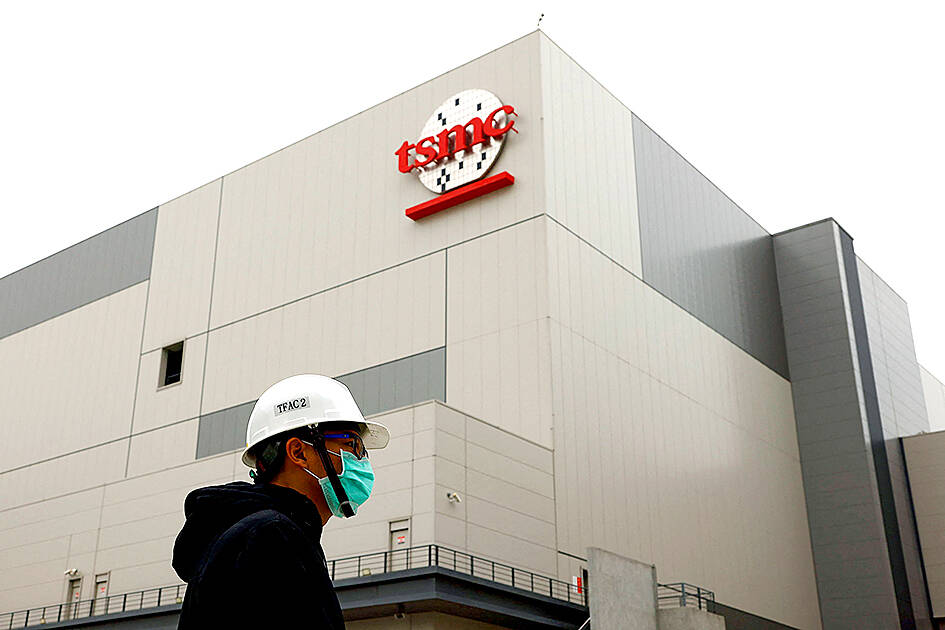The administration of the Central Taiwan Science Park yesterday said it has received approval from the Taichung City Government to go ahead with its second-phase expansion, allowing Taiwan Semiconductor Manufacturing Co (TSMC, 台積電) to begin the construction of a new 2-nanometer fab in June next year.
The expansion plan has been under multiple reviews over one-and-a-half years as the city government and Taichung residents worried that heavy consumption of water and electricity during the chip manufacturing process could pose a risk to supplies in the region.
With tailor-made supply plans under preparation, Taiwan Water Corp (台水) and Taiwan Power Co (台電) have promised that TSMC’s new factory would not lead to insufficient supply of water and electricity when it starts operations during a meeting yesterday with the officials from the Taichung Urban Development Bureau.

Photo: Ann Wang, Reuters
As construction of the fab has been postponed multiple times due to city government reviews, the administration said it would speed up its efforts to clear the final hurdle at the Ministry of the Interior, a statement released by the administration said.
The administration’s goal is to complete all required procedures by the end of this year to facilitate land expropriation. The administration expects to hand over the land to TSMC by the end of June next year, the statement said.
The second-phase expansion is crucial for the nation’s semiconductor development as TSMC is to introduce more businesses in its supply chain to the region, the administration said.
The project is expected to generate NT$485.7 billion (US$15.25 billion) in production value a year and create 4,500 new jobs upon completion, it said.
TSMC, the world’s largest contract chipmaker which counts Nvidia Corp and Apple Inc as its key customers, is also building a 2-nanometer fab, dubbed Fab 20, in Hsinchu, with the aim of starting volume production in 2025.
The firm said its 2-nanometer technology would be the world’s first and most advanced when it is introduced in two years.
TSMC is adding a second 2-nanometer fab as the advanced technology has received strong customer interest.
The 2-nanometer technology would mainly be used for chips for smartphones and high-performance computing devices such as servers, TSMC said.

Application-specific integrated circuit designer Faraday Technology Corp (智原) yesterday said that although revenue this quarter would decline 30 percent from last quarter, it retained its full-year forecast of revenue growth of 100 percent. The company attributed the quarterly drop to a slowdown in customers’ production of chips using Faraday’s advanced packaging technology. The company is still confident about its revenue growth this year, given its strong “design-win” — or the projects it won to help customers design their chips, Faraday president Steve Wang (王國雍) told an online earnings conference. “The design-win this year is better than we expected. We believe we will win

Intel Corp chief executive officer Lip-Bu Tan (陳立武) is expected to meet with Taiwanese suppliers next month in conjunction with the opening of the Computex Taipei trade show, supply chain sources said on Monday. The visit, the first for Tan to Taiwan since assuming his new post last month, would be aimed at enhancing Intel’s ties with suppliers in Taiwan as he attempts to help turn around the struggling US chipmaker, the sources said. Tan is to hold a banquet to celebrate Intel’s 40-year presence in Taiwan before Computex opens on May 20 and invite dozens of Taiwanese suppliers to exchange views

Chizuko Kimura has become the first female sushi chef in the world to win a Michelin star, fulfilling a promise she made to her dying husband to continue his legacy. The 54-year-old Japanese chef regained the Michelin star her late husband, Shunei Kimura, won three years ago for their Sushi Shunei restaurant in Paris. For Shunei Kimura, the star was a dream come true. However, the joy was short-lived. He died from cancer just three months later in June 2022. He was 65. The following year, the restaurant in the heart of Montmartre lost its star rating. Chizuko Kimura insisted that the new star is still down

While China’s leaders use their economic and political might to fight US President Donald Trump’s trade war “to the end,” its army of social media soldiers are embarking on a more humorous campaign online. Trump’s tariff blitz has seen Washington and Beijing impose eye-watering duties on imports from the other, fanning a standoff between the economic superpowers that has sparked global recession fears and sent markets into a tailspin. Trump says his policy is a response to years of being “ripped off” by other countries and aims to bring manufacturing to the US, forcing companies to employ US workers. However, China’s online warriors